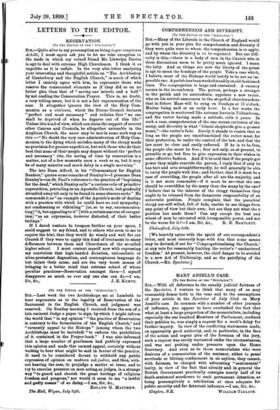LETTERS TO THE EDITOR.
RESERVATION.
[To TUE EDITOR OF THE " SFECTATOR."1 San,—Quite alive to my presumption as being impar congresses Achilli, I must again ask you to let me take exception to the mode in which my valued friend Mr. Llewelyn Davies ie apt to deal with extreme High Churchmen. I think it as impolitic as it is unfair. In the very able letter analysing your interesting and thoughtful article on " The Archbishop of Canterbury and the English Church," in much of which letter I entirely agree with him, he represents those who reserve the consecrated elements as if they did so on no better plea than that of " saving one" minute and a half " by not reading the Consecration Prayer. This is, no doubt, a very telling sneer, but it is not a fair representation of the case. It altogether ignores the view of the Holy Com- munion as a viaticum, which the Nicene Council declares 'perfect and most necessary " and ordains that " no one
shall be deprived of when he departs out of this life." Unless this kind of view, which can claim the support of several other Canons and Councils, be altogether untenable in the Anglican Church, the sneer may be met in some such way as this :—" No doubt the very rare administration of Holy Com- munion to the dying which satisfies many of the clergy needs no provision for greater expedition, but with those who do their best that none of their people may depart without the perfect and necessary' rite, the saving of time by reservation is a matter, not of a few moments once a week or so, but it may be of many minutes and mach delay in a single morning." The late Dean Alford, in his "Commentary for English Readers," quotes some remarks of Stanley's—I presume Dean Stanley's—on St. Paul's reference to the practice of "baptising for the dead," which Stanley calls " a curious relic of primitive superstition, prevailing in-an Apostolic Church, but gradually dwindled away till only to be found in some obscure sects." He commends it as " an example of the Apostle's mode of dealing with a practice with which he could have no real sympathy ; not condemning or ridiculing " [or, so to say, excommunica- ting] "it, but appealing to it" [with a certain amount of recogni- tion] "as an expression, however distorted, of their better feelings."
If I dared venture to trespass farther on your space, I could suggest to my friend, and to others who seem to •me to require the hint, that they would do wisely and well for our Church if they were to apply this kind of treatment to ninny differences between them and Churchmen of the so-called higher school. I must content myself now with expressing my conviction that high-handed dictation, rationalistic or ultra-protestant dogmatism, and contemptuous language do but injure their cause, and are the very worst means of bringing to a better mind that extreme school of whose peculiar practices—Reservation amongst them—I myself disapprove as much as ever any one else can do.-1 am,


































 Previous page
Previous page